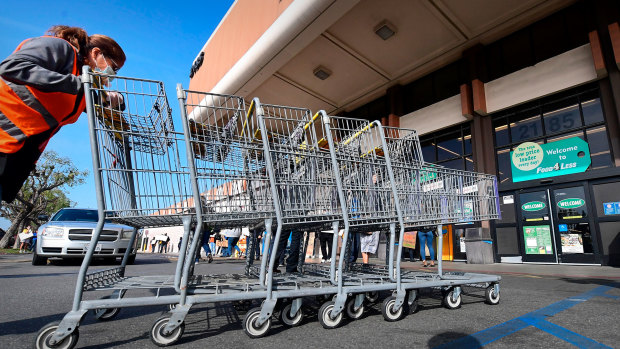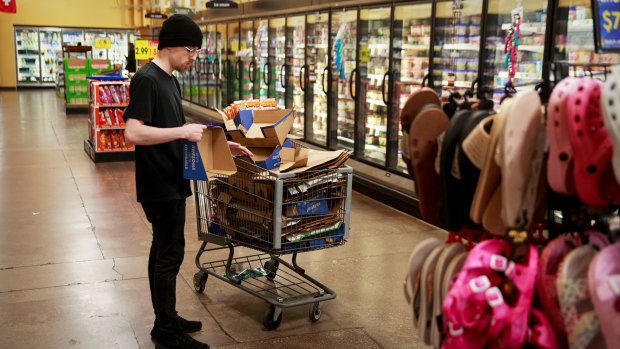
Grocery chains have struggled with where to automate and where to double down on people.
In general, they've opted to use robots behind the scenes or on tasks that people don't like to do (like washing floors) or don't/can't do all that well (like tracking real-time inventory).
Even those efforts have been mixed. Walmart (WMT) -) has tried to automate its order-pickup kiosks and positioned robots to take inventory of store shelves -- only to drop the efforts. Other chains have tried robots, but aside from using automation in select cases to pick and pack mobile orders, most of them have not succeeded.
DON'T MISS: Amazon Takes on One Of America's Biggest Problems
All retailers including Walmart and Target (TGT) -), have expanded their self-checkout lanes, in which customers scan and bag their own items. The technology saves on labor but has led to increased theft (both accidental and intentional).
And it's an effort that most customers don't like. Yes, some of us prefer not to speak with another person, and some have just a few items and appreciate getting out of the store quickly. Most people, however, don't appreciate having to do work that was once performed by another person.
There's also the added task of finding the barcode, bagging the groceries, and waiting for help when an item does not scan. It's a frustrating process that retailers pretend people like because the self-checkout line often has less of a wait than the ones staffed by people.
That's a self-fulfilling prophecy: Store executives act as if customers like self-checkout even though they're picking it because the traditional lanes aren't well-staffed.
Now, Kroger (KR) -) has used that same logic to make a major change in one of its stores, which could become a blueprint for Walmart, Target and other retailers.

Image source: Jeremy Hogan/SOPA Images/LightRocket via Getty Images
Kroger Goes All Self-Checkout
Kroger has adopted an all self-checkout model. So far, it's been implemented at select stores and only one has been confirmed. It has made the change at one of its Tennessee locations and plans to covert another store.
“These allow our customers to scan and bag their own items,” said Lauren Bell, corporate affairs manager for Kroger’s Nashville division, told WKRN. “It’s a fast, friendly experience.”
The spokesperson said the change reflected the rate of people already using the self-checkout.
Again, they might not be using it because they prefer it.
"Because any time you go in that particular store, they would have at most ONE register open. Of course, people are going to use self-checkout more," csguydn shared on Reddit.
That statement was backed up by a lot of other commenters.
"I came in here to say the exact same thing. What a silly statement. It's like if the government said 'People love the DMV! Everyone uses it,'" GoodRiddancePluto added.
A number of Reddit posters also noted that self-checkout saves the company money, which is not necessarily returned to customers.
"I’m a boomer so you know my feelings about this. But hey, let’s find more ways to eliminate jobs. The conglomerate makes billions of dollars and figures this is one more way to line their pockets. Why pay an employee when they can make the customer do it," miknob wrote.
Walmart and Dollar General Embrace Self-Checkout
Kroger's move follows Walmart and Dollar General (DG) -) piloting their own only-self-checkout test stores. These tests are different from what Amazon is doing at its Fresh grocery stores and its Go convenience stores. Those locations use Just Walk Out technology, which does not require a traditional checkout.
The problem for retailers like Dollar General, (DG) -) Walmart, and Target is that Just Walk Out technology requires maintaining customers' credit or debit cards on file in their apps, Amazon has those at a much greater level than other retailers, and most chains likely wouldn't easily get customers to give them that information.
Self-checkout, which according to a recent study now accounts for more than half of all grocery checkout, will likely continue to grow.
DON'T MISS: Amazon's Bestselling Brita Filter Pitcher That Delivers the Taste of 'Fresh Spring Water' Is on Sale for $14
"The bottom line is that registers are inefficient and they are costly to staff. Retailers will reduce and eliminate them as far as they can, albeit while having to keep customer service in mind," Neil Saunders, a managing director at Global Data, told RetailWire.
Get exclusive access to portfolio managers and their proven investing strategies with Real Money Pro. Get started now.







